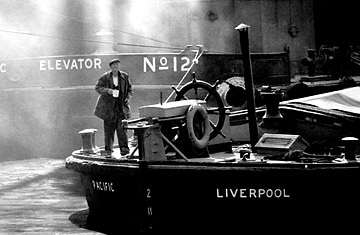
A still from Terence Davies' documentary, Of Time and the City.
A child is quick to learn, slow in the forgetting. So many images and impulses of our youth, their sounds and smells and emotions, stick with us for life, as a comfort or reproach. They have an indelible immediacy: the room you were in the first time you heard That Song, a school outing that revealed fresh pleasures, the weight of an early crush on some boy or girl, the thrill or shiver at a favorite movie — all these are embedded in muscle memory.
Terence Davies has been exercising these muscles for most of his professional life. The writer-director is probably best known for his version of Edith Wharton's The House of Mirth with Gillian Anderson. But that was a detour from his examination of his youth in postwar Liverpool. In a trilogy of short films in the early '80s, and in the features Distant Voices, Still Lives (1987) and The Long Day Closes (1992), he wove a tapestry of family life, of a violent father and gentle mother, an entire neighborhood that soldiered through hard times singing pop songs at the local pub. This was nostalgia with the blinkers off, an epic saga in miniature. The films documented their time and place with an artistic clarity so acute as to be both unbearable and endearing. (See the 100 best movies of all time.)
Davies, then, was just the fellow for the local burghers to summon as a celebrant-critic for the 800th anniversary of the founding of the borough of Liverpool in 1207. They commissioned Of Time and the City, which Davies fashioned into a kind of Liverpool mon amour: a 71-min. documemoir that underscores newsreels of the city, home movies and new footage with romantic strains from Liszt, Mahler, Brahms, Fauré. Anchoring the piece are Davies' fond and acid recollections of his home town — what he, in his drawling, very un-Liverpudlian narrative voice, calls "a valediction and an epitaph." Out on DVD this week from Strand Releasing, this film essay is a grand work, immensely funny and pained and deeply felt. Get the movie, and watch it on a double feature with Guy Maddin's My Winnipeg. You'll have two unforgettable trips through municipal memory.
"Here was my whole world: home, school, the movies and God." Begin with the movies, for they taught young Terry that there was a glamorous land, far from working-class Liverpool, where dreams came true. "At seven," he says, "I saw Gene Kelly in Singin' in the Rain, and discovered the movies, loved them and and swallowed them whole. ... Musicals, melodramas, westerns: Nothing was too rich or too poor for my rapacious appetite, and I gorged myself with a frequency that would shame a sinner." But he wasn't a sinner; he was a convert to the platonic ideal Hollywood painted: "In all those movies it was always Christmas and it was always perfect."
When Davis says that "glorious old Hollywood" was in color, and "small comic England" in black and white, he's referring to the countries as well as the movies. After the war the U.S., the new top empire, rebounded into posterity; Britain, relinquishing India and its centuries of world rule, faced shortages of food, gasoline, all earthly essentials. The grinding deprivation of this grim landscape is superbly evoked by David Thomson, another movie-mad poet, in Try to Tell the Story, his new memoir of growing up in London around the same time as Davies in Liverpool. Davies shows a righteous class contempt for the excesses of Britain's "fossil monarchy," such as "the Betty and Phil Show," his phrase for the marriage of Prince Philip to Elizabeth II. "Even more money was wasted on her coronation... whilst in England's green and pleasant land the rest of the nation survived on rationing in some of the worst slums in Europe."
